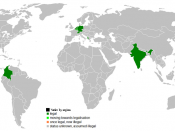The term euthanasia means death without suffering, or a good death. There are four ways to qualify the word euthanasia. Voluntary euthanasia is when a patient makes a conscious decision that his or her life should end, and asks for help in doing so. This is sometimes called assisted suicide. Involuntary euthanasia is when an individual in society makes a positive decision to end the life of someone suffering without consent from the sufferer. Active euthanasia implies some active step, for example the giving of a drug, has been taken to cause the death of a sufferer. Passive euthanasia means no active treatment is given, rather treatment is withheld. Because it arouses questions about the morality of killing, the effectiveness of consent, and the duties of physicians, and equity in the distribution of resources, euthanasia is one of the most acute and uncomfortable contemporary problems in medical ethics. Many people believe euthanasia should not be carried forward, as doctors ought not to kill people and ought not to let them die if it is possible to save.1
Euthanasia has been discussed in relation to most illnesses and age groups through most commonly in relation to diseases associated with severe mental or physical disability or in relation to severe suffering, usually pain. Many people believe that if an individual matters in herself, it is wrong intentionally to kill her, it is morally wrong intentionally to destroy an item that is valuable in itself. This generally means that to prevent a person's suffering depends on the value of that person in herself, and this value places a limit on the extent to which we can rightfully act to prevent her suffering. If she has intrinsic value then euthanasia is immoral; my essay will discuss if it is "always" immoral or not.
I believe that in the UK voluntary euthanasia should be legalised. Many would disagree with me, but I believe that voluntary euthanasia is fundamentally by choice. The option of an assisted death should be there for those who are incurably ill and suffering unbearably. Patients should only consider an assisted death if they have explored all the other options available to them. Palliative care involves treating the pain and other symptoms of patients whose illness is not responding to efforts to cure, such as those with terminal cancer. Its goal is to achieve the best possible quality of life for the patient and their family. Some terminal pain and other distressing symptoms cannot be fully controlled, even with the best care. However, it is the quality of life, rather than pain, that is often the main reason behind a patient's request for help in dying. Why should we force someone to live the last days or weeks of their life in a way, which, to them, is undignified? Voluntary euthanasia is above all, about personal choice and to this extent I believe euthanasia is moral. Physicians must be willing to accept that not all patients can be "cured", but that most can be helped by reducing disability, by relieving pain and suffering, or by allowing people to die with dignity.2
Many believe that life is sacred, a gift from God, and must not be deliberately ended. This is a view that must be respected. Other opposition to voluntary euthanasia focuses on the idea of the "slippery slope". This theory states that legalising voluntary euthanasia for those who are incurably ill and ask for help in dying would inevitably lead to other types of euthanasia which I do not believe should be performed such as non-voluntary euthanasia. There is no evidence for such an argument - it is unfounded speculation. The theory states that it would be difficult to stop sliding down and might eventually result in accepting compulsory euthanasia. However it is not always the case that once one sort of practice is accepted we are able to distinguish between a clearly defined case and other more dubious practices. One example of this is noted by Rachels, who shows that while society tolerates killing in self-defence, allowing this practice has not resulted in the wholesale killing of innocent human beings.3 Voluntary euthanasia - helping a patient to die at their own considered request - is a world away from the murder of vulnerable people. Voluntary euthanasia would make sure that incurably ill people who persistently ask for help to die would be able to make sure of a dignified and compassionate death and I believe that up to this extent euthanasia is moral. As Ronald Dworkin, professor of Law at Oxford and New York University, said in 1994: "Of course doctors know the moral difference between helping people who beg to die and killing those who want to live. If anything, ignoring the pain of terminally ill patients pleading for death rather than trying to help them seems more likely to chill a doctor's human instincts".4
Some people who do not agree with voluntary euthanasia argue if it was legalised, it would damage the moral and social foundation of society by removing the traditional principle that man should not kill, and reduce the respect for human life. But we already let people die because they are allowed to refuse treatment which could not save their life or they die in a war, and this has not damaged anyone's respect for the worth of human life. So even if human life has intrinsic value, euthanasia is not always immoral.
At the moment, doctors can legally practice "passive" euthanasia - that is, taking away or withholding treatment even if the person will die. However, doctors cannot directly help the person to die, for example, by giving a lethal injection. I can argue that, in situations where a competent, terminally ill patient is asking for help to die, passive euthanasia has exactly the same moral and practical result as giving a lethal injection at the patient's request. At the moment, the law and current medical practice do not match. In 1994 a survey published in the British Medical Journal showed that some doctors already help patients to die. Few doctors have been prosecuted and like Dr Cox, who was convicted of attempted murder in 1992, they have always been treated with sympathy. Doctors are also legally able to give pain-relieving treatment in such high doses that people may die more quickly. This is known as the "double effect" - relieving the patient's suffering is the accepted consequences of such treatment, with death as an unintended outcome.5 I believe that it seems illogical to condemn active euthanasia whilst condoning passive euthanasia. After all, the same end is to be achieved whatever the method of primary intention. However, to others the method is all important, as is the primary intention. Many would feel that their consciences would not allow them to carry out or be a party to active euthanasia, and that they should certainly not be under any obligation to do so; yet their consciences would be clear if they sat with a relative while the patient refused treatment and passed through the last hours of his life.6
Many people would argue that the doctrine of euthanasia applies to harm, not to the production of good outcomes. I believe that physician-assisted suicide and voluntary euthanasia intends to benefit the patient. Some may object that these ideas make no sense. But can a person be harmed by her own death even though death means that she is no longer around to suffer the harm? Suppose a person's life would go on containing only misery and pain with no compensating goods. That person will be better off living a shorter life containing fewer such uncompensated for bad things rather than a longer one containing more of them. By interfering, the person's death benefits him: it prevents the worse life.
Many think that helping a patient to survive is an obligation. Everything must be done to preserve life. It is not admissible to economise when it is a matter of saving a human life. However, maintaining an artificial vegetable existence in the case of a terminal patient is by no means a humanitarian act. The patient is in fact the sole judge of his quality of life, and may prefer to die in dignity and without any more suffering.7 Under certain legal conditions, a conscious request for active euthanasia is accepted in the Netherlands. The same is true in certain states in Australia and the United States. Active Euthanasia is considered by many people to be the last vestige of freedom, which remains to a conscious and informed person who rejects the indignity of his final condition.8 The relationship between health professionals and patients is based on trust and this is essential for achieving high standards of patient care. Consequently it could be argued that if there is a possible threat to this relationship in allowing active euthanasia, the practice ought not to be allowed. Almost all arguments favouring voluntary active euthanasia make some form of appeal to principles of beneficence and respect for autonomy. Arguments from beneficence look at the consequences of an action to assess its impact on the interests and welfare of the person who will die. But to oppose this view I can say that there are cases in which relief from suffering supersedes all other consequences and therefore even if human life has intrinsic value, euthanasia is moral to this extent. Here the principle of respect for autonomy obligates society to respect the decisions of autonomous persons and not to limit their liberty to end their lives. In respecting their autonomy it is not necessary to agree with their judgements, only to accord them their right to act upon their decisions. When a condition has become overwhelmingly burdensome for a patient, pain management for the patient is inadequate and only a physician seems capable of bringing relief.9
I believe everyone has the right to choose how he or she live and die. Each person has value and is worthy of respect, has basic rights and freedom and the power to control his or her destiny. To legalise assisted dying within certain strictly defined circumstances is fundamentally about choice. "Interfering with nature" has brought about enormous improvements in the comfort and quality of our arrival into the world. It is about time that we devoted at least an equal amount of attention, both philosophical and technical, to the comfort and quality of our departure from it.


